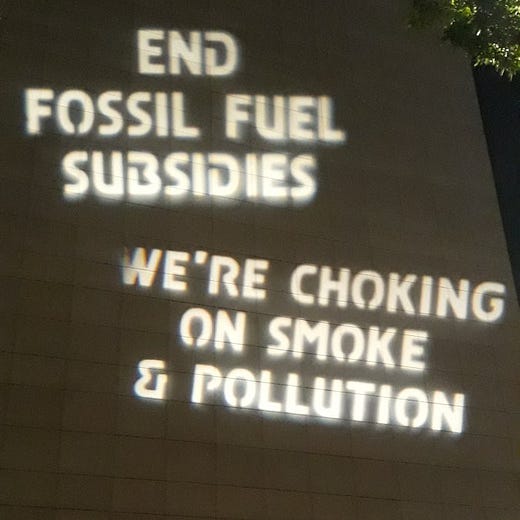Oil poisons our politics and wetlands, while critics get jail time
The industry’s powerful influence is a disaster on all fronts.
Emily Sanders is the Center for Climate Integrity’s editorial lead. Catch up with her on Twitter here.
Faced with escalating calls for accountability — in Congress, board rooms, universities, and the courts — Big Oil is still wreaking havoc.
Oil and gas giants are still working to quash the country’s (last?) shot at passing urgently needed climate action before it’s too late, even as they tout their commitment to climate solutions. With the unprecedented house arrest and now sentencing of human rights attorney Steven Donziger, Chevron has sent a strong message to communities trying to make them pay for destroying land and lives. And speaking of which, a massive oil pipeline spill turned miles of California coastline into a toxic graveyard this week.
We’re here with the (gruesome) details and a reminder of the stakes.
Big Oil is “fighting tooth and nail” to kill climate action… again.
Just weeks before a major Congressional hearing into the oil and gas industry's role in pushing climate disinformation to block climate action, the biggest players in oil and gas are, well … spreading climate disinformation to block climate action.
The American Petroleum Institute (API), which has been sued by cities and states for decades of lying to consumers and the public about climate damages now ravaging their communities, won’t stop until the climate policy in Biden’s infrastructure package is dead in the water.
As reporting from HuffPost this week explained, API and other industry giants are flat-out lying to the public about their “economic incentive” to regulate their own emissions in lieu of provisions like a price on methane, which was introduced by Senators Sheldon Whitehouse and others as a potential piece of climate policy in the upcoming package.
And according to data analyzed by UK thinktank InfluenceMap, which tracks corporate spending on policy, API has spent nearly half a million dollars to run ads on Facebook deriding the bill, viewed at least 21 million times, since the Senate passed a budget resolution on August 11.
Exxon spent $275,000 in the past week alone on Facebook ads targeting the bill for raising taxes on the industry.
The industry has practice thwarting U.S. climate policy before it could pass, most recently killing the Waxman-Markey Act, the would-be historic price on carbon that was nixed after the powerful oil and gas trade association went on an advertising spree against the bill during Obama’s first term. API is even using the same front group — Energy Citizens — as it did then to push ads decrying climate legislation as bad for jobs and the economy.
“These industry groups are pulling out all the stops — from advertising to public messaging — to oppose the reconciliation bill,” Kendra Haven, InfluenceMap’s U.S. program manager, told E&E News. “This level of strategic activity, particularly through targeted advertising campaigns, exposes the value of their positive-sounding, top-line statements on climate.”
Seems like something Oversight House members should bring up with API President Mike Sommers, who has been asked to testify on October 28.
Attorney who took on Chevron gets 6 months, will appeal
Steven Donziger, the attorney who won a $9.5 billion judgment against oil giant Chevron for poisoning the Ecuadorian Amazon rainforest, was this week sentenced to six months in prison for criminal contempt of court (i.e., refusing to turn over his phone and laptop to the judge, which Donziger said would violate attorney-client privilege).
Donziger has promised to appeal the ruling. His sentencing follows an unprecedented two-plus year house arrest and unrelenting attacks by Chevron, which still refuses to pay the judgment they owe to Indigenous Ecuadorians suffering the after-effects of their toxic pollution. Chevron has promised to fight the judgment “until hell freezes over, and then fight it on the ice.”
The day before Donziger’s sentencing, a United Nations’ human rights body stated that Donziger’s house arrest violates international law, and urged the U.S. to release him. “The charges against and detention of Mr. Donziger appears to be retaliation for his work as a legal representative of indigenous communities,” reads their report, “as he refused to disclose confidential correspondence with his clients in a very high profile case against a multi-national business enterprise.”
Perhaps worth wondering why an attorney who takes on Chevron gets prison time, while the attorney who defends Chevron is getting awards for defending free speech.
California oil spill causing massive devastation
Over the weekend, a failed offshore oil operation spilled more than 126,000 gallons of heavy crude from a pipeline off the coast of Orange, California, leaving a 13 square-mile slick and a harrowing scene as dead wildlife washed up from the Pacific.
Mayor Kim Carr of Huntington Beach, where the longer-term effects of the spill’s ecological damage are so far unknown, said at a news conference that it was “one of the most devastating situations our community has dealt with in decades.” Across from Huntington Beach, the oil slick seeped into the Talbert Marsh, a 25 acre wetland and ecological reserve home to 80 species of birds.
Amplify Energy, the corporation responsible for the offshore oil operation, had a hefty reputation for negligence before the spill.
Stories like these will continue to litter our news feeds, their lasting impact lost in a sea of updates on climate and environmental disaster, until executives of these companies are held accountable. We hope to see the ghouls in Congress on the 28th —I know all of us have a few questions we’d like answered.
ICYMI News Roundup








